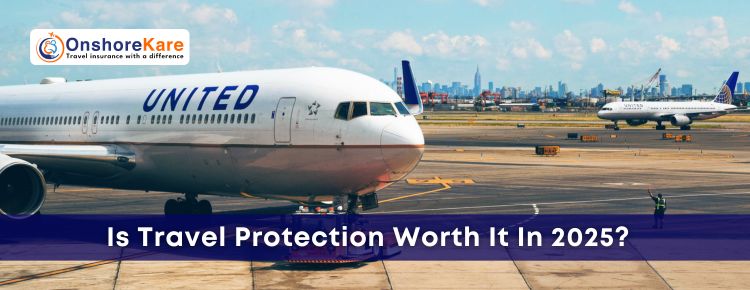
Is Travel Protection Worth It: Expert Guide For 2025
Is Travel Protection worth it in 2025? Travel is an enriching experience, but it often comes with uncertainties. Many factors can disrupt your plans, from unexpected cancellations to weather-related delays, medical emergencies, or lost baggage. This is where travel protection steps in, offering you financial security and peace of mind.
A comprehensive travel insurance plan is an essential supplement to existing credit card protections, particularly for covering unforeseen medical emergencies and lost luggage. But is it worth the cost? Let’s explore everything you need to know in this expert guide.
NOTE: It is important to understand the difference to choose between travel medical insurance or trip insurance.
Expert Opinions And Statistics
- Travel Data Insights: Studies show that up to 25% of trips face disruptions, highlighting the value of travel protection.
- Expert View: Travel agents often recommend protection for trips with high upfront costs or during unpredictable seasons.
What Is Travel Protection?

Travel protection is a type of coverage designed to protect your financial investment in travel. It primarily focuses on non-medical benefits like:
- Trip Cancellation: Reimburses prepaid expenses if you cancel for covered reasons like illness or emergencies.
- Trip Interruption: Covers costs incurred if you need to cut your trip short.
- Travel Delay: Pays for extra accommodations or meals during delays.
- Baggage Protection: Compensates for lost, delayed, or damaged luggage.
Unlike travel insurance, travel protection typically doesn’t include extensive medical or evacuation coverage. It focuses on safeguarding your travel expenses against unforeseen disruptions.
Key Benefits Of Travel Protection
- Financial Security: If you’ve invested in non-refundable flights, hotels, or tours, travel protection reimburses you if unforeseen circumstances force you to cancel or interrupt your trip. The insurance cover includes reimbursement for these non-refundable expenses, ensuring you don’t lose your investment.
- Flexibility With Add-Ons: Options like Cancel For Any Reason (CFAR) coverage allows you to cancel your trip for nearly any reason and still receive partial reimbursement, offering unparalleled flexibility. CFAR helps reimburse non-refundable expenses.
- Coverage For Delays: Travel protection covers additional expenses due to delays, such as extra hotel nights, meals, and transportation.
- Lost Or Delayed Baggage: Get reimbursed for essential items if your baggage is delayed or compensation if it’s lost or damaged.
- 24/7 Assistance Services: Most plans offer services like help with rebooking flights or finding alternative accommodations in emergencies.
- Financial Safeguard Against Trip Cancellations: Travel protection reimburses you for non-refundable expenses, such as flights, hotels, or tours, if your trip gets canceled due to covered reasons like illness, severe weather, or emergencies. This is especially beneficial for expensive trips with significant prepaid costs.
- Support During Travel Disruptions: Travel delays or interruptions can result in unexpected expenses like hotel stays, meals, or rebooking costs. Travel protection helps cover these extra costs, minimizing financial strain during stressful situations.
Real-Life Scenarios Where Travel Protection Helps
- Luxury Trips: You’ve booked a non-refundable $10,000 luxury cruise. A week before departure, you fall ill and can’t travel. Travel protection can reimburse you for the costs.
- Travel During Unpredictable Seasons: Flying during Winter? Bad weather could cause cancellations or delays, making travel protection a smart choice.
- Family Vacations: Traveling with kids? The chances of last-minute cancellations or disruptions are higher. Travel protection ensures your investment is safe.
- Complicated Itineraries: For trips with multiple flights and connections, the chances of disruption are greater. Protection can save you from financial losses.
Travel protection, including trip insurance, can be a valuable investment depending on your travel plans, needs, and risk tolerance.
It offers benefits such as reimbursement for cancellations, coverage for medical emergencies, and protection against various travel disruptions.
When Is Travel Protection Worth It?
Travel protection is particularly beneficial for:
- International trips with high costs.
- High-cost trips with substantial prepaid expenses.
- Travel during unpredictable times (e.g., bad weather or global events).
- Trips with complex itineraries or multiple connections.
- International travel where disruptions or medical issues are more challenging to resolve.
- Cruises, which are often non-refundable.
It may not be necessary for short domestic trips where costs and risks are minimal, but it’s invaluable for high-risk or expensive journeys.
When deciding to purchase travel insurance, it’s important to evaluate personal situations and trip details to ensure adequate financial protection.
While not every traveler will require it, travel protection is worth considering if the cost of losing your trip investment or facing disruptions outweighs the premium cost. It’s a proactive way to handle potential travel risks.
Is Travel Protection Worth It? Let’s Find Out

Travel protection is often worth it depending on the nature of the trip, traveler preferences, and potential risks involved.
Here are some key justifications for purchasing travel protection:
1. Financial Security
- Unforeseen Cancellations: Travel protection helps safeguard your prepaid costs (like flights, hotel bookings, or tours) if you need to cancel due to covered reasons such as illness, natural disasters, or job loss.
- Example: If a traveler cancels a $5,000 vacation due to a sudden illness, travel protection can reimburse the non-refundable expenses.
2. Emergency Medical Coverage
- Medical Emergencies Abroad: Many health insurance plans do not cover medical costs outside your home country. Travel protection provides coverage for medical emergencies and emergency evacuation expenses.
- Example: A traveler who sustains an injury requiring airlift and treatment overseas could face costs exceeding $50,000—expenses that travel protection can cover.
3. Peace Of Mind
- Stress-Free Travel: Knowing you’re covered for disruptions like flight cancellations, baggage loss, or unexpected emergencies offers peace of mind, letting you enjoy your trip without constant worry.
4. Protection Against Travel Disruptions
- Trip Interruptions and Delays: Travel insurance cover includes protection for expenses incurred due to missed connections, severe weather, or travel supplier bankruptcy. It is important to understand that coverage can vary significantly between different policies.
- Example: A traveler stuck due to a snowstorm can claim additional accommodation and meal expenses.
5. Coverage For Lost Or Delayed Baggage
- Compensation for Personal Belongings: If your luggage is lost or delayed, travel protection ensures you are compensated or reimbursed for essentials purchased during the delay.
6. Specialized Plans
- Pre-existing Conditions and CFAR: Many travel protection plans offer options like “Cancel for Any Reason” (CFAR) or coverage for pre-existing medical conditions, making them customizable to specific needs. CFAR helps you get nonrefundable trip costs reimbursed.
- Example: If a traveler with a chronic condition experiences a flare-up, they may need to cancel or receive medical care abroad, both covered by such plans.
7. Travel Frequency
- For Frequent Travelers: Annual travel protection plans can provide year-round coverage, proving cost-effective for those who take multiple trips.
Is Travel Protection Worth It: Analyzing Cost vs. Benefits

Planning a trip can make you wonder if you should buy travel protection. The cost of insurance can add up, but it offers financial security and peace of mind. Let’s look at what affects travel insurance costs and the benefits it offers. This will help you decide if it’s worth it for your trip.
Cost Of Travel Protection
Travel protection typically costs between 4-10% of the total trip cost. For example:
- A $5,000 trip might incur a $200-$500 premium.
- Adding CFAR could increase costs by another 50%.
Compare this to the potential financial loss of canceling a trip or facing disruptions, and the investment becomes justifiable for many travelers.
Get a trip insurance policy, explore plans.
Factors Affecting Travel Insurance Cost
The cost of travel insurance changes based on several things, including:
- The trip cost – The more expensive your trip, the higher the insurance cost.
- Your age – Older travelers usually pay more for insurance.
- The trip’s length – Longer trips need more and costlier coverage.
- The coverage level you pick – Basic plans are cheaper, but more comprehensive plans cost more.
Potential Benefits Of Travel Protection
Even though travel insurance cost might seem high, its benefits are big. Travel protection can:
- Protect your finances from unexpected trip cancellations or delays.
- Cover medical expenses, emergencies, and evacuations abroad.
- Help you get back lost, stolen, or damaged luggage and personal items.
- Assist with travel delays, missed connections, and other travel problems.
Choosing to buy travel protection depends on your travel needs, budget, and how much risk you’re willing to take. By thinking about the cost vs. benefits, you can make a smart choice.
This choice will give you the right amount of financial protection and peace of mind for your trip.
The Pros And Cons Of Travel Protection
Pros Of Travel Protection
- Financial security for non-refundable trip expenses.
- Medical evacuation insurance for emergencies abroad.
- Trip interruption coverage due to unforeseen events.
Cons Of Travel Protection
- The cost of travel protection can be a deterrent for budget travelers.
- Overlapping coverage if you already have credit card travel protection.
- Limitations on specific incidents or exclusions for high-risk activities.
Types Of Travelers Who Benefit The Most From Travel Protection
- Frequent Travelers: Those booking multiple trips annually can bundle coverage for cost savings.
- Senior Travelers: Older travelers often encounter health-related cancellations. Coverage for unexpected medical expenses is crucial for senior travelers to protect against potential costs, especially if they need to cancel their trip.
- Adventure Seekers: Travelers engaging in high-risk activities benefit from additional protection.
When Travel Protection May Not Be Worth It
- Short, Low-Cost Trips: For inexpensive trips where potential losses are minimal, travel protection may not provide significant value.
- Existing Coverage: If your credit card or existing insurance already offers sufficient travel benefits, additional protection may not be necessary.
How Travel Protection Differs From Regular Insurance
Travel insurance companies provide similar protection to regular insurance but with some differences.
- It’s made for the unique risks of traveling, like flight cancellations and medical emergencies abroad.
- The coverage limits and insurance policies are set to meet the needs of travelers.
This way, you have a safety net when unexpected things happen.
What To Look For In A Travel Protection Plan
- Covered Reasons:
Understand what constitutes a valid reason for cancellation or interruption. Typical reasons include illness, weather disruptions, and emergencies. - Coverage Limits:
Check the maximum reimbursement amount for trip costs and other benefits. - Exclusions:
Be aware of what’s not covered, such as pre-existing conditions or intentional cancellations (unless CFAR is included). - Claim Process:
Choose a provider with a straightforward claims process and good customer reviews.
How To Buy Travel Protection
- Compare Plans: Use online tools to compare providers and coverage options.
- Read the Fine Print: Ensure the plan aligns with your travel needs and budget.
- Buy Early: Purchase coverage soon after booking your trip for maximum benefits.
Trip Cancellation And Trip Interruption Insurance Explained

Travel insurance can seem complex, but knowing about trip cancellation and interruption is key. These protections help keep your travel costs safe. They give you peace of mind if you have to cancel or shorten your trip unexpectedly.
Trip cancellation insurance helps you get back money for nonrefundable costs if you cancel. This includes things like flights and hotel bookings. It covers reasons like illness, job loss, and natural disasters. So, you won’t lose money if you have to cancel your trip.
On the other hand, trip interruption insurance helps if you have to leave early. It covers costs for unused parts of your trip and getting home. Reasons include medical emergencies, family issues, and travel delays.
For any trip, whether it’s a vacation or a business trip, these protections are very useful. They protect your money if you need to cancel your trip or cut it short. Getting trip cancellation insurance and trip interruption insurance means you can travel without worry.
Here’s a comparison between Trip Cancellation Insurance and Trip Interruption Insurance:
| Aspect | Trip Cancellation Insurance | Trip Interruption Insurance |
|---|---|---|
| Definition | Covers prepaid, non-refundable trip costs if you cancel your trip before departure for covered reasons. | Covers additional expenses or unused trip costs if your trip is interrupted after it has started. |
| When It Applies | Before the trip begins. | During the trip. |
| Common Covered Reasons | Illness, injury, death of the traveler or family member, natural disasters, or severe weather preventing travel. | Medical emergencies, severe weather, political unrest, or emergencies requiring early return home. |
| Reimbursement | Refunds non-refundable expenses like flights, hotels, and tours. | Reimburses unused portions of the trip and extra costs incurred to return home early. |
| Example Scenario | You cancel a trip due to a serious illness diagnosed a week before departure. | You are on a trip and must return home due to a family emergency or natural disaster at the destination. |
| Key Benefits | Protects your investment in the trip. | Covers unforeseen costs and helps salvage your trip. |
| Limitations | Only covers specified reasons listed in the policy (unless you add Cancel for Any Reason). | Limited to interruptions occurring after the trip has begun. |
| Cost | Typically lower compared to interruption insurance. | Often included in comprehensive plans or as an add-on. |
Both insurances are essential for mitigating financial risks, but the choice depends on when and how you want to protect your travel investment. Comprehensive travel protection plans often combine both types for full coverage.
Baggage Loss And Travel Delay Coverage Benefits

Traveling can be tough, especially with lost bags or delays. Luckily, travel protection plans help with these issues. Let’s look at the main benefits of covering baggage loss and travel delays.
Protection For Personal Belongings
Travel insurance helps a lot with lost, stolen, or damaged luggage. It can pay for new items, so you don’t worry about packing. It covers things like clothes, toiletries, and even electronics or jewelry.
Flight Delay And Cancellation Compensation

Flight delays or cancellations can mess up your plans and cost extra money. Travel insurance often covers these costs. It helps pay for meals, hotels, and even rebooking fees. This way, you won’t have to worry about the extra expenses.
Local Transit And Connection Coverage
Travel insurance might also cover missed connections or local transport delays. This is great if you use buses, trains, or taxis to get where you need to go. With this coverage, you’ll get money back for any extra costs from these delays.
Knowing about the benefits of baggage loss and travel delay coverage helps you decide if travel insurance is worth it. It offers financial security and peace of mind for your trips. Whether it’s lost luggage or flight issues, these options can make your travels worry-free.
Travel Insurance Exclusions
Travel insurance policies often have exclusions that limit or eliminate coverage for certain events or circumstances.
Understanding these exclusions is crucial before purchasing a policy to ensure you have the right coverage for your needs.
Here are some common exclusions to be aware of:
- Pre-existing Medical Conditions: Many travel insurance policies exclude coverage for pre-existing medical conditions unless you purchase a waiver or meet specific requirements. This means if you have a known health issue, it might not be covered unless you take additional steps.
- High-Risk Activities: If you plan on engaging in high-risk activities such as skydiving, bungee jumping, or scuba diving, be aware that many policies exclude coverage for these activities. Always check if your policy includes an adventure sports rider if you’re an adrenaline junkie.
- Travel to High-Risk Destinations: Some policies may exclude coverage for travel to countries with high levels of crime, terrorism, or civil unrest. It’s essential to check the travel advisories and ensure your destination is covered.
- Self-Inflicted Injuries: Policies typically exclude coverage for self-inflicted injuries or illnesses. This includes situations where harm is intentionally caused by the insured.
- War or Terrorism: Events related to war or terrorism are often excluded from coverage. If you’re traveling to a region with potential conflict, this is a critical exclusion to consider.
- Government Restrictions: Policies may exclude coverage for events related to government restrictions or travel advisories. For instance, if a government issues a travel ban, your policy might not cover cancellations or interruptions resulting from this.
Understanding these exclusions helps you make an informed decision when purchasing travel insurance, ensuring you have the right protection for your specific travel plans.
Conclusion
Travel protection isn’t one-size-fits-all, but for many, it offers peace of mind and financial security. Evaluate your travel plans, and risks, and decide if it’s worth the investment. For those booking costly or complex trips, travel protection is often a small price to pay for safeguarding your travel dreams.
FAQ
What is travel protection, and how does it differ from regular insurance?
Travel protection, also known as travel insurance, is a special insurance for trips. It covers risks and unexpected events that can happen on a trip. Unlike regular insurance, it’s made for the unique challenges and costs of traveling, like trip cancellations and lost luggage.
What are the different types of coverage provided by travel protection plans?
Travel protection plans cover many things. They include trip cancellations, medical emergencies, and lost luggage. Some plans also offer extra benefits like adventure sports coverage and 24/7 help.
How do I determine if travel protection is worth the cost?
Think about the risks and costs of your trip when deciding if travel protection is worth it. Consider the destination, trip length, activities, and non-refundable expenses. Compare the cost of the plan to the benefits and peace of mind it offers.
What does medical coverage include in a travel protection plan?
Medical coverage in travel protection plans includes emergency medical costs. This includes doctor visits, hospital stays, and prescription drugs. Some plans also cover pre-existing medical conditions.
How do trip cancellation and interruption coverage work?
Trip cancellation and interruption coverage can refund your trip costs if you need to cancel or cut your trip short. This is for reasons like illness or family emergencies. It helps protect your investment in the trip.
What types of benefits are included in baggage and travel delay coverage?
Baggage and travel delay coverage can reimburse you for lost or delayed luggage. It also covers unexpected expenses from flight delays or cancellations. This includes money for clothes and toiletries.
Are there any situations where I should skip buying travel protection?
You might not need travel protection if your health insurance or credit card already covers your trip. Or if you’re taking a low-risk, domestic trip with few non-refundable costs. But for most travelers, especially on international or adventure trips, it’s a smart choice.


